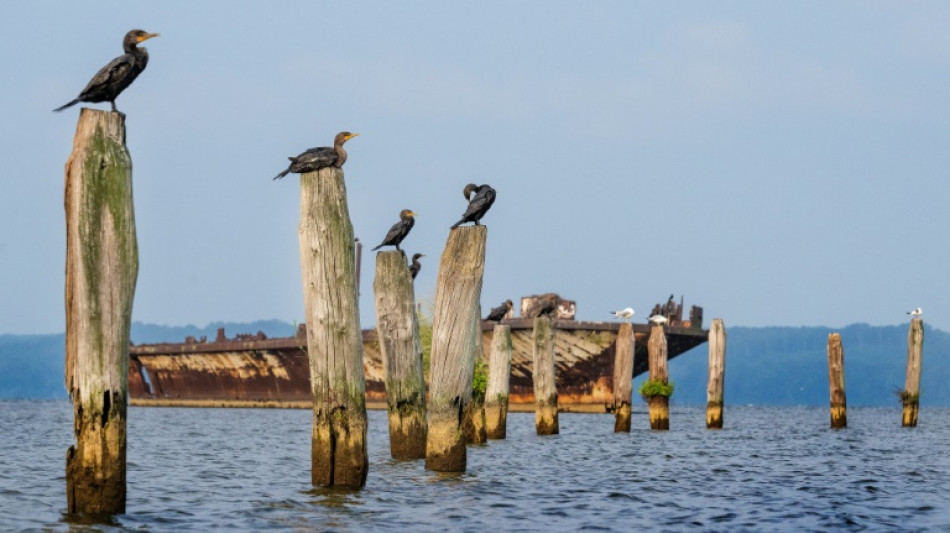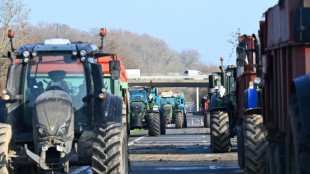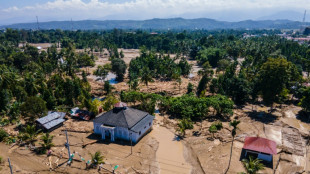
-
 Liverpool's Slot says 'no issue to resolve' with Salah after outburst
Liverpool's Slot says 'no issue to resolve' with Salah after outburst
-
'Stop the slaughter': French farmers block roads over cow disease cull

-
 Stormers see off La Rochelle, Sale stun Clermont in Champions Cup
Stormers see off La Rochelle, Sale stun Clermont in Champions Cup
-
Maresca hails Palmer as Chelsea return to winning ways against Everton

-
 Hungarian protesters demand Orban quits over abuse cases
Hungarian protesters demand Orban quits over abuse cases
-
Belarus frees protest leader Kolesnikova, Nobel winner Bialiatski

-
 Salah sets up goal on return to Liverpool action
Salah sets up goal on return to Liverpool action
-
Palmer strikes as Chelsea return to winning ways against Everton

-
 Pogacar targets Tour de France Paris-Roubaix and Milan-San Remo in 2026
Pogacar targets Tour de France Paris-Roubaix and Milan-San Remo in 2026
-
Salah back in action for Liverpool after outburst

-
 Atletico recover Liga momentum with battling win over Valencia
Atletico recover Liga momentum with battling win over Valencia
-
Meillard leads 'perfect' Swiss sweep in Val d'Isere giant slalom

-
 Salah on Liverpool bench for Brighton match
Salah on Liverpool bench for Brighton match
-
Meillard leads Swiss sweep in Val d'Isere giant slalom

-
 Indonesia flood death toll passes 1,000 as authorities ramp up aid
Indonesia flood death toll passes 1,000 as authorities ramp up aid
-
Cambodia shuts Thailand border crossings over deadly fighting

-
 First urban cable car unveiled outside Paris
First urban cable car unveiled outside Paris
-
Vonn second behind Aicher in World Cup downhill at St Moritz

-
 Aicher pips Vonn to downhill win at St Moritz
Aicher pips Vonn to downhill win at St Moritz
-
Thailand says 4 soldiers killed in Cambodia conflict, denies Trump truce claim

-
 Fans vandalise India stadium after Messi's abrupt exit
Fans vandalise India stadium after Messi's abrupt exit
-
Women sommeliers are cracking male-dominated wine world open

-
 Exhibition of Franco-Chinese print master Zao Wou-Ki opens in Hong Kong
Exhibition of Franco-Chinese print master Zao Wou-Ki opens in Hong Kong
-
Myanmar junta denies killing civilians in hospital strike

-
 Why SpaceX IPO plan is generating so much buzz
Why SpaceX IPO plan is generating so much buzz
-
Thailand continues Cambodia strikes despite Trump truce calls

-
 US envoy to meet Zelensky, Europe leaders in Berlin this weekend
US envoy to meet Zelensky, Europe leaders in Berlin this weekend
-
North Korea acknowledges its troops cleared mines for Russia

-
 US unseals warrant for tanker seized off Venezuelan coast
US unseals warrant for tanker seized off Venezuelan coast
-
Cambodia says Thailand still bombing hours after Trump truce call

-
 Machado urges pressure so Maduro understands 'he has to go'
Machado urges pressure so Maduro understands 'he has to go'
-
Leinster stutter before beating Leicester in Champions Cup

-
 World stocks mostly slide, consolidating Fed-fuelled gains
World stocks mostly slide, consolidating Fed-fuelled gains
-
Crypto firm Tether bids for Juventus, is quickly rebuffed

-
 Union sink second-placed Leipzig to climb in Bundesliga
Union sink second-placed Leipzig to climb in Bundesliga
-
US Treasury lifts sanctions on Brazil Supreme Court justice

-
 UK king shares 'good news' that cancer treatment will be reduced in 2026
UK king shares 'good news' that cancer treatment will be reduced in 2026
-
Wembanyama expected to return for Spurs in NBA Cup clash with Thunder

-
 Five takeaways from Luigi Mangione evidence hearings
Five takeaways from Luigi Mangione evidence hearings
-
UK's king shares 'good news' that cancer treatment will be reduced in 2026

-
 Steelers' Watt undergoes surgery to repair collapsed lung
Steelers' Watt undergoes surgery to repair collapsed lung
-
Iran detains Nobel-prize winner in 'brutal' arrest

-
 NBA Cup goes from 'outside the box' idea to smash hit
NBA Cup goes from 'outside the box' idea to smash hit
-
UK health service battles 'super flu' outbreak

-
 Can Venezuela survive US targeting its oil tankers?
Can Venezuela survive US targeting its oil tankers?
-
Democrats release new cache of Epstein photos

-
 Colombia's ELN guerrillas place communities in lockdown citing Trump 'intervention' threats
Colombia's ELN guerrillas place communities in lockdown citing Trump 'intervention' threats
-
'Don't use them': Tanning beds triple skin cancer risk, study finds

-
 Nancy aims to restore Celtic faith with Scottish League Cup final win
Nancy aims to restore Celtic faith with Scottish League Cup final win
-
Argentina fly-half Albornoz signs for Toulon until 2030


New research reveals where N. American bird populations are crashing
Birds are facing a population crisis, but a lack of high-quality localized data has made it difficult to understand the drivers behind specific declines and to craft effective conservation responses.
Now, a team of researchers has developed an innovative solution, combining vast amounts of data from a popular birding app with machine learning and advanced statistical methods to overcome the challenges posed by large-scale citizen science projects.
Their study, published Thursday in Science, reveals that North American bird populations are being hit hardest in their traditional strongholds, as rapid environmental shifts -- including climate change -- disrupt these once-reliable refuges.
"We have known for a long time that bird populations are declining," lead author Alison Johnston, an ornithologist and ecological statistician at the University of St Andrews, told AFP.
"What we aimed to do here was to look at better population trends in much more detail," she said -- data that is "a lot more tailored for conservation decisions and understanding what we can actually do on the ground."
A landmark 2019 paper also in Science found that North America had lost 2.9 billion breeding adult birds between 1970 and 2017 -- a net loss of nearly a third. The 2025 US State of the Birds report found continued declines in nearly every ecological biome.
Birds play vital roles in ecosystems, from pollinating plants and dispersing seeds to controlling pests.
Their loss disrupts food chains, undermines forest health, reduces crop yields -- and deprives people of the joy of watching species that have long been part of human culture.
But the threats are diverse: from prairie loss impacting Baird's Sparrows in the Midwest to Hawaiian birds threatened by rising seas and invasive predators, including cats.
Johnston and colleagues turned to eBird, an open-source project, analyzing 36 million observations spanning 2007 to 2021 across North America, Central America, and the Caribbean.
A major challenge with citizen science data is separating changes in bird populations from changes in how people watch birds.
The team overcame this with several innovations: using only checklists where observers recorded all species seen; accounting for variables like observation time and distance traveled; and applying a machine learning model that controlled for shifting birding behavior.
They validated the approach through thousands of simulations, ultimately focusing on 495 species for which the results proved reliable.
Unlike previous monitoring that tracked trends at the state or regional level, their analysis looked at plots 27 kilometers by 27 kilometers (17 miles by 17 miles) -- roughly the size of New York City.
Key findings included that 97 percent of species had both areas of increasing population and areas of decline, revealing hidden complexity.
Wood ducks for instance are declining in the Southeast US but thriving farther north, suggesting a climate-related shift.
The study also found that 83 percent of species are shrinking fastest in areas where they were most abundant, particularly grassland and aridland breeders.
The reasons aren't fully known, but one theory is that birds adapted to rich environments may be less resilient to rapid change than those evolved for harsher conditions.
Conversely, some aridland, forest, and generalist species are rebounding in parts of their range where they were once scarce -- pointing to pockets of opportunity.
The findings are already being used by wildlife agencies, for example in permitting wind energy projects to minimize impacts on species such as Bald Eagles.
Y.Zaher--SF-PST



